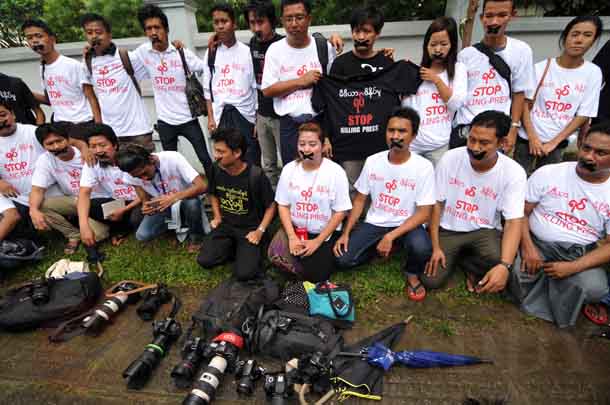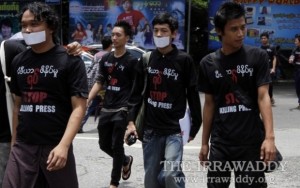Posts Tagged ‘Journalists’ (41 found)
A Return to the Bad Old Days for Freedom of Expression
 In a scarcely believable and punishingly harsh act of repression, four journalists and the CEO of Unity journal were sentenced by a Magwe Region court on 10 July to ten years imprisonment with hard labor for reporting on a story on a chemical weapons factory, giving a damming indictment of press freedom in Burma today. This occurred just days after President Thein Sein described Burma as “one of the freest in Southeast Asia” due to media reforms.
In a scarcely believable and punishingly harsh act of repression, four journalists and the CEO of Unity journal were sentenced by a Magwe Region court on 10 July to ten years imprisonment with hard labor for reporting on a story on a chemical weapons factory, giving a damming indictment of press freedom in Burma today. This occurred just days after President Thein Sein described Burma as “one of the freest in Southeast Asia” due to media reforms.
In January 2014, Unity journal published an investigative report on a chemical weapons factory in Magwe Region, central Burma, with accounts from factory workers, local villagers and photos of the site. While the Burma government eventually admitted it is a ‘standard ordnance factory’ that produces ordinary military equipment, an analysis of the images by the Center for Nonproliferation Studies concludes that there is strong evidence that this isn’t just a normal arms factory, and is consistent with chemical weapons factories in other places, such as North Korea. It is ironic that the journalists who published a story on chemical weapons are jailed for ten years under the State Secrets Act, while the Burma government denies it is making chemical weapons. Related to this, a point that has been overlooked slightly over the past week is that Burma must implement the measures of the Chemical Weapons Convention that it signed in 1993 and thus clear up the issue of whether Burma does have the capability to manufacture such equipment, as the Unity journalists reported and are now in prison for. […]
• • •Burma: State Leash on Media Freedoms at its End
With the passage of Burma’s Press Law in April this year, there had been a glimmer of hope that the case of the journalists from Unity Journal would be given a bit of protection for their daring expose of an alleged chemical weapons plant in the Magwe division last January.
After all, the new law guaranteed that no journalist may be jailed for doing her or his work […]
• • •Police Investigations and Prosecutions Used to Harass News Media
Until recently, the media freedom situation in Burma was very promising but this is no longer the case. Reporters Without Borders is alarmed by the interrogation of many newspaper editors since 20 June and by the president’s recent expressions of hostility to freedom of information. In a threatening comment on 7 July, President Thein Sein said: “If there is any media that exploits media freedom and causes harm to national security rather than reporting for the sake of the country, effective legal action will be taken against that media.” […]
• • •Hague Urged to Act To Free Zaw Pe
Burma Campaign UK today launches a campaign calling on British Foreign Secretary William Hague to personally intervene to secure the release of jailed DVB journalist, Zaw Pe […]
• • •BURMA: Letter to President Obama on Continuing National Emergency
Dear President Obama,
Our organizations urge you to continue the national emergency with respect to Burma. Since May 20, 2013, the Burmese government has failed to substantively address any of the concerns that informed the renewal of Executive Order 13619 […]
• • •Unity Journalists’ Lawyer objects to Court Procedure
An eighth court hearing for the CEO and four reporters of Unity Weekly news journal took place at a court in the town of Pakokku on Monday morning.
The five were arrested after Unity published a report on 25 January alleging that a factory in Magwe Division was in fact secretly manufacturing chemical weapons. CEO Tint San and four reporters – Sithu Soe, Paing Thet Kyaw, Yazar Oo and Lu Maw Naing – were subsequently charged with violating the State Secrets Act […]
• •Call for Probe Into Military Junta’s Crimes Against the Media
Reporters Without Borders has written an open letter to Burmese President Thein Sein, who begins a two-day visit to France tomorrow, calling for an investigation into the former military government’s crimes against the media since 1962 […]
• • •European Parliament Urges Burma to Respect Right to Information
Reporters Without Borders hails yesterday’s European Parliament resolution on the plight of Burma’s Rohingya Muslims, who are not only persecuted by the authorities and denied Burmese citizenship, but also denied access to news and information and subjected to an information blackout […]
• • •Burma Ends Pre-Publication Check, Not Censorship
 Prior submission of print media content that had been imposed for the last 48 years ended when the Press Scrutiny and Registration Board (PSRD) introduced its post-publication checks that came effective on 20 August. Journals and newspapers no longer need to submit their publication beforehand but afterward. However, the 1962 Printers and Publishers Registration Act and the 2004 Electronics Transaction Act that have been repeatedly used to jail journalists and activists are still in place. Journals have been suspended and could still be suspended at any time. Furthermore, journalists and reporters have to abide by the newly introduced 16-point ethical guidelines that prohibit them from criticizing the state.
Prior submission of print media content that had been imposed for the last 48 years ended when the Press Scrutiny and Registration Board (PSRD) introduced its post-publication checks that came effective on 20 August. Journals and newspapers no longer need to submit their publication beforehand but afterward. However, the 1962 Printers and Publishers Registration Act and the 2004 Electronics Transaction Act that have been repeatedly used to jail journalists and activists are still in place. Journals have been suspended and could still be suspended at any time. Furthermore, journalists and reporters have to abide by the newly introduced 16-point ethical guidelines that prohibit them from criticizing the state.
These repressive laws as well as the arbitrary regulations and code of conduct imposed on media and journalists remain a great threat to media freedom. The PSRD still monitors the content of publications and any newspaper or journal risks prosecution if any of their content breaks the guidelines. This has the very real potential of resulting in greater self-censorship […]
• • •Imprisoned for Reporting
A legal analysis of the cases of five Burmese video-journalists, who remain in prison despite the release of some 200 political prisoners by the Burmese government, discloses flagrant breaches of human rights. The Note, by the Centre for Law and Democracy, found widespread abuses of the rights to freedom of expression, freedom of association and freedom from torture. The violations result from both the Burmese government’s abusive application of laws that restrict freedom of expression, and their capricious application of broader legislation to target political opponents […]
• • •








 All posts
All posts